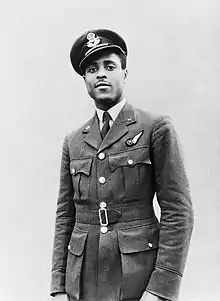John Henry Clavell Smythe
John Henry Clavell Smythe MBE (1915–1996), was a significant figure in newly independent Sierra Leone. He was born a Sierra Leone Creole into the British Empire and served as a navigation officer in the Royal Air Force. He was shot down over Nazi Germany and spent two years as a prisoner of war. After liberation and return to Britain, he played a role in the beginning of the Windrush Generation. He retrained as a lawyer, returned to his birthplace, and served as Attorney General of Sierra Leone.
John Henry Clavell Smythe | |
|---|---|
 Pilot Officer J H Smythe RAFVR of Sierra Leone, photographed while undergoing training at No 11 Operational Training Unit, Westcott, Buckinghamshire | |
| Born | 1915 Freetown, Sierra Leone Colony and Protectorate |
| Died | 1996 (aged 80–81) Thame, Oxfordshire, England, United Kingdom[1] |
| Allegiance | |
| Service/ | Royal Air Force |
| Years of service | 1939–1951 |
| Rank | Flight Lieutenant |
| Service number | 144608 |
| Battles/wars | World War II • Western Front |
| Awards | Member of the Order of the British Empire (MBE) |
| Spouse(s) | Violet Wells Bain |
| Other work | Barrister, Attorney General of Sierra Leone |
Early life and family background
Johnny Smythe was born in 1915 in Freetown, Sierra Leone to a Creole family, a grandson of John H. Smythe, American ambassador to Liberia. Johnny Smythe attended the Sierra Leone Grammar School and subsequently worked as a clerk for the city council.
Military service
Smythe was one of the few West Africans to serve in the Royal Air Force during the Second World War. On 14 May 1943, he received an emergency commission as a pilot officer in the RAFVR,[2] and was promoted war-substantive flying officer six months later.[3] After 26 successful bombing missions which earned him a reputation for being lucky, as the No. 623 Squadron RAF Short Stirling aircraft he flew in were hit several times but always managed to return, he was shot down and spent 18 months as a prisoner of war in Stalag Luft I camp.[1]
On 14 May 1945, a week after the war ended, Smythe was promoted war-substantive flight lieutenant in the RAFVR,[4] receiving a regular commission as a flight lieutenant in the RAF on 9 May 1947 (seniority from 14 November 1947).[5]
After the war, Smythe joined the Colonial Office, with responsibility for the welfare of demobilised RAF personnel from Africa and the Caribbean. In 1948 he became the senior Colonial Office official on the Empire Windrush, a captured German troop ship taking former military personnel back to their homes in the Caribbean. On discovering that it would be very hard for the men to find jobs in Jamaica, Smythe consulted the Colonial Office, which agreed that the men should return to Britain. West Indians who settled in Britain from that point became known as the Windrush generation.[6] For his services, Smythe was appointed a Member of the Order of the British Empire, Military Divison (MBE) in the 1951 Birthday Honours.[7] He ended his active service in the RAF in June 1951, transferring to the reserves.[8]
Later career
After Smythe twice successfully defended men facing courts martial, despite having no legal training, a judge suggested that he take up a career in law and provided a letter of introduction. He qualified as a barrister and returned to Freetown, Sierra Leone's capital, where he was appointed a Queen's Counsel and eventually became Attorney General.
On an official visit to the United States, Smythe was invited to the White House by President John F. Kennedy. Both Smythe and Kennedy had back pain because of injuries sustained during the Second World War, and Kennedy recommended that Smythe consult his own chiropractor.[1]
At a social occasion in Freetown, Smythe was talking to the German Ambassador. In the course of conversation, the ambassador revealed that he had been a fighter pilot who shot down his first British bomber on the date and in the place where Smythe had been shot down.[1]
References
- Stokes, Tim (8 January 2021). "The airman from Sierra Leone who was shot down over Nazi Germany". BBC News.
- "No. 36100". The London Gazette (Supplement). 16 July 1943. p. 3282.
- "No. 36254". The London Gazette (Supplement). 16 November 1943. p. 5079.
- "No. 37093". The London Gazette (Supplement). 22 May 1945. p. 2664.
- "No. 38009". The London Gazette (Supplement). 4 July 1947. p. 3120.
- "Windrush Generation: Who Are They and Why Are They Facing Problems?". BBC News. 31 July 2020.
- "No. 39243". The London Gazette (Supplement). 1 June 1951. p. 3069.
- "No. 39504". The London Gazette (Supplement). 28 March 1952. p. 1820.